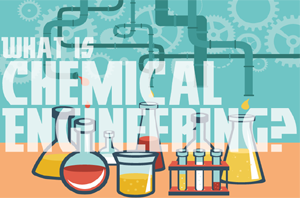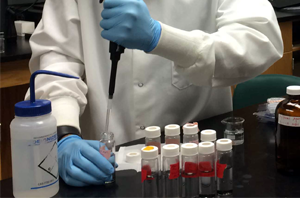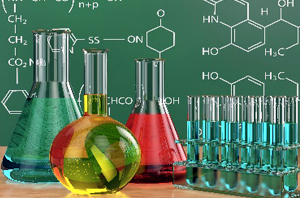Department of Chemical Engineering Peshawar Campus
Chemical Engineering is the branch of engineering, which blends the knowledge of basic sciences with engineering to develop, design, analyze and engineer the industrial processes and plants that turn raw materials into valuable products. These processes must be accomplished in safe, cost effective and sustainable manner to create products, which are useful and essential to the modern world. Chemical Engineering is based upon the fundamentals of mass, momentum, and heat transfer, thermodynamics and chemical kinetics. Chemical Engineers are equipped with the necessary skills that encompass detailed understanding of all aspects of design, testing, scale-up, operation, control, and optimization of different unit operations. They are familiar with many industries such as petroleum and petrochemicals, plastics, fibers, paper, food processing, building materials, water desalination and pharmaceuticals. A Chemical Engineering degree is also a good preparation for careers in pollution prevention and waste minimization.
Faculty & Staff of Chemical Engineering Peshawar Campus- Academic Programs
- - B.Sc. Chemical Engineering
- - M.Sc. Chemical Engineering
- - Ph.D. Chemical Engineering
Mission of the Department
"To produce graduates of excellent technical, professional and scientific background in chemical engineering for the benefits of global society to work with the industry and community to help in boosting national economy and professional well-being"
The undergraduate program in the department of chemical engineering embodies the following expected accomplishments of graduates,
PEO-1. Be engaged in advanced studies in chemical engineering or professional development towards continuing education opportunities related to their career.
PEO-2. Be successful leaders in applying chemical engineering principles and techniques for continued industrial growth and sustainable development.
PEO-3. Be expected as a contributor with leading role to participate in the development of socio-economic environment of the community and society through their professional career and entrepreneurships.
Department of Chemical Engineering has adopted twelve Program Learning Outcomes (PLOs). PLOs are controlled through the curriculum. All the courses are mapped to thoroughly cover these PLOs. The Program Learning Outcomes (PLOs) of the Department of Chemical Engineering are given below. These are the skills that our students are expected to acquire at the time of graduation.
PLO-1. Engineering Knowledge
An ability to apply knowledge of mathematics, science, engineering fundamentals and an engineering specialization to the solution of complex engineering problems.
PLO-2. Problem Analysis
An ability to identify, formulate, research literature, and analyse complex engineering problems reaching substantiated conclusions using first principles of mathematics, natural sciences and engineering sciences.
PLO-3. Design/Development of Solutions
An ability to design solutions for complex engineering problems and design systems, components or processes that meet specified needs with appropriate consideration for public health and safety, cultural, societal, and environmental considerations.
PLO-4. Investigation
An ability to investigate complex engineering problems in a methodical way including literature survey, design and conduct of experiments, analysis and interpretation of experimental data, and synthesis of information to derive valid conclusions.
PLO-5. Modern Tool Usage
An ability to create, select and apply appropriate techniques, resources, and modern engineering and IT tools, including prediction and modelling, to complex engineering activities, with an understanding of the limitations.
PLO-6. The Engineer and Society
An ability to apply reasoning informed by contextual knowledge to assess societal, health, safety, legal and cultural issues and the consequent responsibilities relevant to professional engineering practice and solution to complex engineering problems.
PLO-7. Environment and Sustainability
An ability to understand the impact of professional engineering solutions in societal and environmental contexts and demonstrate knowledge of and need for sustainable development.
PLO-8. Ethics
Apply ethical principles and commit to professional ethics and responsibilities and norms of engineering practice.
PLO-9. Individual and Teamwork
An ability to work effectively, as an individual or in a team, on multifaceted and/or multidisciplinary settings.
PLO-10. Communication
An ability to communicate effectively, orally as well as in writing, on complex engineering activities with the engineering community and with society at large, such as being able to comprehend and write effective reports and design documentation, make effective presentations, and give and receive clear instructions.
PLO-11. Project Management
An ability to demonstrate management skills and apply engineering principles to one's own work, as a member and/or leader in a team, to manage projects in a multidisciplinary environment.
PLO-12. Lifelong Learning
An ability to recognize importance of, and pursue lifelong learning in the broader context of innovation and technological developments.
Practical Training
Apart from academic activities, students are required to complete 800 hours of practical training as part of the B.Sc. Chemical Engineering Degree. This practical training is arranged during summer vacations in various national and international organizations and chemical industries. The major fields of interest are petroleum refinery, gas processing, petrochemical, polymer, sugar, fertilizer, cement, glass, ceramic and other process industries. This training also helps students in the selection of their final year projects for addressing existing field oriented problems. Various companies including Oil and Gas Development Company Limited, MOL, Fauji Fertilizer Company, Bestway Cement, Cherat Cement, Attock Oil Refinery, Pakistan Ordinance Factory, PCSIR, Frontier Ceramics, Mari Petroleum, Pakistan Petroleum Limited and many other national and multi-national level companies offer internships to the students of department.
Industrial Visits
The Department is in close contact with government departments and private chemical industries. Field visits to chemical industries are arranged regularly, ranging across the whole country. Such field visits are found very helpful in broadening the vision of the students in the field of Chemical Engineering.
Placement Opportunities
There is a broad range of employment opportunities for Chemical Engineers, from large multi-national companies to small locally based companies, e.g. refineries, oil and gas fields, fertilizer industries, cement plants, ceramic and pharmaceutical industries. Graduates of this department are recognized as amongst the country's finest Chemical Engineers. The Department has so far produced around 800 engineers. Our graduates are working effectively in various chemical engineering related fields having highly attractive packages at both national and international level; most of them are holding responsible positions in public and private organizations. Some graduates are also making career in teaching and research by pursuing advanced studies abroad.




